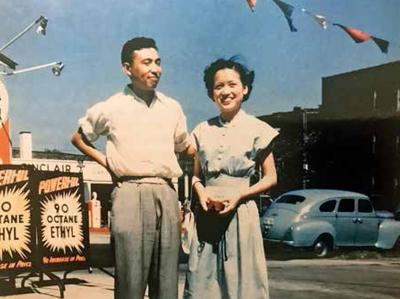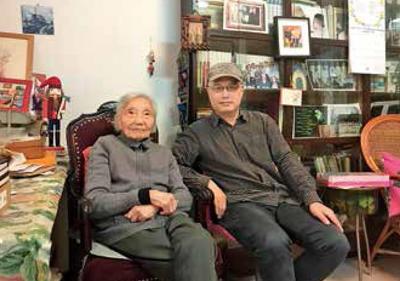今我不述,更等何时
2020-04-20邹汉明
邹汉明



徐志摩和穆旦,海宁竟然奢侈地拥有这样两位诗人。当大多数人谈论徐志摩的时候,也有少数人在谈论穆旦。
穆旦是谁?
我最初只知道他是浙江海宁人,本名查良铮,查家的良字辈。穆旦一名,原是将“查”字上下一拆为二,“木”“穆”谐音,故取笔名穆旦。
查家是海宁的望族。这个姓氏在中国有2600多年的历史,在海宁已经延续了近600年,在查良铮生活的天津也有100多年的历史。
查家历代出过不少文化上有建树的人物。而最近一位大家都知道的大人物便是良字辈的查良镛,武侠小说的一代宗师。这是很容易发生联想的。
事实上,穆旦从来没有到过海宁。这是他的长子查英传十数年前电话里头告诉我的。但海宁方面却一直把穆旦看作当地的文化名人,这也确乎有其理由。在穆旦所有需要填写的表格上,籍贯一栏,他都认认真真填着“浙江海宁”。
我大概就是从海宁对外介绍的小册子上知道穆旦的。又因为自己也写诗的缘故,就很自然地关注到他了。徐志摩和穆旦,海宁竟然奢侈地拥有这样两位诗人。当大多数人谈论徐志摩的时候,也有少数人在谈论穆旦。
一
1996年9月,中国文学出版社出版了一套“20世纪桂冠诗丛”,其中收入了李方编选的《穆旦诗全集》。当时尚在《诗刊》工作的邹静之先生给我寄了这套书。我收到后,用3天时间读完了其中的一册,掩卷沉思,感慨不可谓不多。这是我第一次全面细致地阅读穆旦。不仅读了他的诗,也读了李方编撰的《穆旦(查良铮)年谱简编》。我对诗人的生平总算有了一个大致的了解。
我对穆旦诗的认识就是从那个时候开始的。
20世纪90年代以来,我们这些创作新诗的年轻人,都大量阅读翻译体诗,对本土的新诗传统很少注意,更遑论研究了。但自从读到穆旦,我认识到,他的150余首长长短短的诗,已经为中国新诗提供了一个可以信任的本土的文本,我们不该那么无视。3年后,因为写作,我从桐乡一个偏僻的乡村中学调入嘉兴秀洲区文化馆。有近一年的时间,我僦居在老市区干戈弄嘉兴图书馆附近,因而常去图书馆下面的秀州书局,坐一坐喝一杯热茶。那阵子,我过了一段惬意的时光。又3年,我开始留意与穆旦有关的信息,并计划着那一次又一次的外出采访。
首先想到要去一趟海寧。这不仅因为穆旦的祖籍地是在海宁。那时,得知海宁有一位叫陈伯良的,正在撰写穆旦的传记。2003年8月24日,我在一位虞姓朋友的介绍和陪同下冒着酷暑去拜访。我的愿望是想跟陈伯良借一册资料书,但他显然有所警惕,没有告诉我他那时其实已开笔在写《穆旦传》。当我提出能否借阅穆旦逝世10周年出版的《一个民族已经起来》的时候,陈先生不置可否地抬起眼睛看了看我,说,书不知堆在哪里,一时找不到。我顿感一种口没遮拦的冒昧。毕竟初次见面,他对我也不了解。倒是虞姓朋友的一句“先生一般不出借书”解了围。但我仍很感谢他跟我谈到他跟穆旦夫人周与良以及穆旦妹妹和子女等人多年的书信往来。我知道,陈先生着手早,占有资料收集的便利。这次交谈没有深入,大概30分钟后,我就告辞了。
2005年3月,我突然收到他签赠的《穆旦传》。收到的当天,我打电话表示感谢和祝贺。陈问我,我着手的穆旦传写得怎么样了,同时告诉我要抓紧,据他所知,国内有研究者也正在赶写穆旦的评传。这回轮到我支支吾吾了。其实那时,我差不多已经在打退堂鼓了。
二
2003年11月底,我又赶去温州城区花柳塘采访诗人唐湜,这回在程绍国兄的介绍下很顺利地采访到了唐老。而且,还意外地获赠了唐湜多余的一册《一个民族已经起来——怀念诗人、翻译家穆旦》。而从唐湜口头说出来的穆旦,也给了我一种如在眼前的亲切之感。
2004年1月31日,在林莽和邹静之两位先生的介绍下,我去清华大学采访郑敏。郑先生拿出《丰富和丰富的痛苦:穆旦逝世二十周年纪念文集》交给我,告诉我可到附近的文印店复印一册。为了节省一点复印费,书中那几篇稍长且已有的文章我就跳过没有复印。所以,现在我手头的这册特殊的纪念集,根本就是不完整的。
北京采访结束,我又南下去了天津,走访了南开中学和南开大学。在天津朋友的帮助下,在南开东村采访到穆旦的老同事辜燮高、董泽云夫妇,也部分地获得了诗人在南开图书馆工作时一些有意思的细节。辜先生后来还给我来过一信,因担心采访时口头表述有不恰当的地方,关照我以信中的文字表述为准。老先生经历过非常的时期,谨慎是他们那一代人的特征。其严谨如此,也颇令我动容。
也许是机缘巧合,在与穆旦生前交往密切的当事人中,我还采访过来新夏和杨苡。
来先生2004年来嘉兴图书馆参加百年庆典,我在秀州书局轻松地跟他聊了一次穆旦。他跟我讲到他与穆旦一道打扫游泳池和厕所的往事。
而杨苡,早在2004年的时候,我曾致信于她,可惜当时未联系到。不料15年后的2019年10月,我却颇有缘分地走进了杨先生的书房,而这年杨先生已经101岁了,其思维之清晰,记忆力之好,简直就是人世的一个奇迹。因为事先电话联系好了,杨先生已有所准备,我们非常愉快地畅谈了一个下午的穆旦。临走,她亲送我到门口,还一再指引我可走前门出小区。我跟她说,过段时间希望再去看望她,杨先生说:“欢迎!”顿了一下,睁着一双101岁的大眼睛,很有个性地告诉我:“我很少说欢迎的!”我跟杨先生的长谈,这次也增补在相关的章节中了。回返的路上,我甚至觉得,杨先生以她异乎寻常的长寿,似乎正等着这一次关于穆旦的长谈。感谢这位睿智而直爽的老人给我带来了一个形象而立体的穆旦。
三
在最初的一些采访和资料收集完成后,我因工作调动以及专心于诗歌创作而中断了穆旦的研究。但其间,我不时听到朋友和众多文学前辈的传话,希望我能够写出《穆旦传》,这其中包括这些年研究穆旦成果累累的易彬博士。而我却以年纪大一点再写也不迟为理由,一再地推延着,直到2018年,穆旦诞辰100周年,我心血来潮,将一篇旧作交由微信公众号采蓝小调推送以纪念诗人。广西师大出版社上海分社主持“文学纪念碑丛书”的魏东兄读到后,通过其他朋友问到我的邮箱然后发来一封信,询问我“有没有继续推进的打算”。就这样,他报送了选题。半年后,出版社通过了选题,我这才着手《穆旦传》的写作。
在接下來的11个月里,我还算顺利地完成了这35万字的传记。不过,在传记写到一半的时候,感觉很难深入下去了,觉得应该有新的材料来充实传主的一生。幸好有朋友知道了我的难处,于是介绍我去南开大学档案馆查档。
这是我第二次专程去南开大学。我还在穆旦住了20多年的南开东村的一家校园宾馆里住了一晚。这一晚,因感觉上就住在查家附近,触景生情,一时三刻竟然睡不着觉。很凑巧,那晚,《南方人物周刊》的副主编、诗人和翻译家杨子兄打来电话。我知道杨子是南开大学毕业的,就告诉他,你知道我此刻在哪里吗?我说我正在穆旦的南开,就住在他家南开东村70号附近。晚上杨子跟我聊了很长时间的穆旦。原来,他跟穆旦的夫人熟悉。他求学时去过查家多次,穆旦夫人周与良女士也多次借他民国版的穆旦诗集阅读。杨子还跟我说到一个有趣的细节,20世纪80年代初,他去南开大学图书馆借英文版诗集来读,发觉这些书都没有其他人借阅过,除了一个人的签名:查良铮。
第二天,我在档案馆很顺利地查阅了穆旦的原始档案。其中丰富的内容,现在都补入下半部中了。可惜没有时间,否则也可以去图书馆,查阅一下那些老版的英文原著,细细体味一下穆旦的签名。
传记的写作,写还真不是一个问题,查档才是。查档就是慢慢地寻找和发现传主的一个过程。但资料收集的艰难,真是一言难尽的。但在寻找的路上,也会有不少有意思的事情发生——
我记得,在我乘往南开大学的公交车上,曾巧遇一名退休多年的南开女士,很多年前,她远远地见过穆旦,对诗人的遭遇也有所耳闻。得知我去八里台查穆旦的档案,老人叹息一声后,跟我讲起了南开的往事。临别的时候,这位眉目清秀的老人特意走到我身旁,拉住我的手,在我的手心里认认真真地写了一个字,并对我说:“今我不述,更等何时。你做的是有意义的事!”
闻听此话,我心头一热,觉得写作期间所有遇到的困难都不值一提了。这也许就是传记作者得到的最好的安慰——何况这句话,我有幸当面从一位经历了那些往事的老人那里听到。
Mu Dan Rediscovered
By Zou Hanming
I began writing in 2018, but I first learned about him many decades ago. Back then, I didnt know I was to write such a book. At the very first, all I knew about Mu Dan (1917-1977), except for his poems, was next to nothing: Mu Dan was a native of Haining and Mu Dan was the penname of Zha Liangzheng. The Zha clan is 2,600 years old if one really wants to trace the ancestral roots of the Zhas. The surname has been in Haining for nearly 600 years. The Zha branch in Haining has had many outstanding members. To most Chinese, the most outstanding member is Zha Liangyong, aka Jin Yong, a Wuxia novelist. Mu Dan, however, is little known to most Chinese even though his poems are popular inside literary circles.
I learned about ten years ago from Zha Yinchuan, the eldest son of Mu Dan, that Mu Dan had never visited Haining even though he always wrote Haining as his hometown whenever he filled in forms. He was born and brought up in Tianjin. After a four-year study in America, he came back to Tianjin and taught at Nankai University until he passed away in 1977.
In September 1996, I received , just published by China Literature Press, from Zou Jingzhi then working at the , the countrys number one poetry publication. I spent three days reading the first volume. It was the first time that I learned so much about Mu Dans poems. The poems were astonishingly beautiful. Many Chinese poets in the 1990s began studying the translated works of foreign poets and many Chinese poets were deeply influenced by translated poems stylized by Chinese language and foreign languages. Some even deliberately wrote poems in this style. After reading Mu Dans poems, which added up to about 150 in number, I became aware that Mu Dan wrote poems in such a style decades ahead of the poets in the 1990s and that his exemplary poems were a landmark that should never be overlooked.
In the early years of the 21st century, I began to toy with the idea of writing a book about Mu Dan. It occurred to me that I needed to visit Haining. First of all, Haining is where Mu Dan came from. Secondly, I learned that Chen Boliang, a scholar in Haining, was writing a biography of Mu Dan. On August 24, 2003, I visited Chen Boliang at his home. My intention was to borrow a book about Mu Dan published in 1987 in commemoration of the tenth year of the demise of Mu Dan. Chen was very cautious. He was all mum about the fact that he was writing a biography of Mu Dan. He said he had the book but he was not sure exactly where it was in the heaps of books in his study. But in the following conversation, he mentioned his correspondences with Mu Dans wife, Mu Dans younger sister and Mu Dans adult children. I was aware that he had conducted a very good research on Mu Dan due to his early start. The 30-minute conversation was courteous but not extremely helpful.
In March 2005, I received a copy of from Chen Boliang. I phoned him and congratulated him. He asked me directly about the progress I was making on the book I was writing. He warned me that a scholar was writing a critical biography of Mu Dan. I wasnt straight with Chen. Frankly, I am not honest if I say I never thought of giving up. But I persisted.
I did not decide to write the book until 2018. Some friends and scholars in the literary circles knew about my plan and urged me to go ahead. In 2018, I published an essay online in commemoration of the 100-year anniversary of the birth of Mu Dan. An editor read my essay and contacted me. Half a year later, the publisher gave me the green light and I began writing. I spent 11 months in 2018 writing the book. When I found I got stuck, I decided to do some additional research.
My research progressed slowly but steadily. In October 2019, I even had a long talk with the 101-year-old Yang Yi, a preeminent translator in her prime years. I visited her and, to my surprise, she spoke clearly and her memory was miraculously sharp. I made a call in advance and on the afternoon of the next day, we talked the whole afternoon about Mu Dan. The retired translator was very happy. After the visit, she even walked me to the gate of the residential compound.
And I visited the archives of Nankai University to see whether there was something that could help me finish the book. The hotel where I stayed was just a stones throw from the house where Mu Dan once lived. A friend in Tianjin told me something about Mu Dan. It was in the 1980s. The friend went to the Nankai University library to check out some poetry collections in English. He found that Zha Liangzheng had been the only reader of all the English poetry books. On the bus to the university, I chatted with a woman and she said she had seen Mu Dan on the campus from afar so many decades ago. She said there should be a book about Mu Dan so that his story could be known to the world.
Though the book is not yet published, I feel I have rediscovered Mu Dan through the research and writing.
